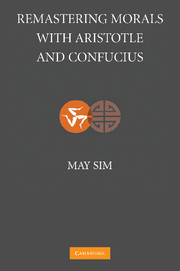Book contents
- Frontmatter
- Contents
- Acknowledgments
- Abbreviations
- Introduction
- 1 Aristotle in the Reconstruction of Confucian Ethics
- 2 Categories and Commensurability in Confucius and Aristotle: A Response to MacIntyre
- 3 Ritual and Realism in Early Chinese Science
- 4 Harmony and the Mean in the Nicomachean Ethics and the Zhongyong
- 5 The Moral Self in Confucius and Aristotle
- 6 Virtue-Oriented Politics: Confucius and Aristotle
- 7 Making Friends with Confucius and Aristotle
- Glossary of Chinese Terms
- Name Index
- Subject Index
3 - Ritual and Realism in Early Chinese Science
Published online by Cambridge University Press: 18 July 2009
- Frontmatter
- Contents
- Acknowledgments
- Abbreviations
- Introduction
- 1 Aristotle in the Reconstruction of Confucian Ethics
- 2 Categories and Commensurability in Confucius and Aristotle: A Response to MacIntyre
- 3 Ritual and Realism in Early Chinese Science
- 4 Harmony and the Mean in the Nicomachean Ethics and the Zhongyong
- 5 The Moral Self in Confucius and Aristotle
- 6 Virtue-Oriented Politics: Confucius and Aristotle
- 7 Making Friends with Confucius and Aristotle
- Glossary of Chinese Terms
- Name Index
- Subject Index
Summary
Is it a prejudice merely of Western thinking to suppose that learning and knowledge want definition and a due measure of objectivity? Given that learning is such an important element in Confucian thought, it might seem strange that commentators such as Hall and Ames and Chad Hansen deny that Confucius is interested in the pursuit of definitions. They contrast Confucius with ancient Greek thinkers such as Aristotle, for whom definitions are key. I want to show that definition and what we call “objectivity” are among the goals of name rectification for Confucius and for practices of study in classical China. Name rectification, in turn, is best understood to be a matter of adjusting language with its objectives so that a harmony of the human and the nonhuman orders, as well as human social harmony, is the outcome. Naming is not merely a political or aesthetic phenomenon. I begin this chapter with Aristotle. It is well known that concern with definition permeates his entire corpus, but it is not so well known why definition is crucial. I say why and then contrast this with Confucius and his tradition. Although the rectification of names always serves practice, I disagree with commentators such as Ames and Hansen, who insist that Confucius is never interested in getting the “right” name that would, like a definition, align language with nonhuman nature. I argue that Confucius is concerned with this alignment, which is served by rectification.
- Type
- Chapter
- Information
- Remastering Morals with Aristotle and Confucius , pp. 72 - 99Publisher: Cambridge University PressPrint publication year: 2007

